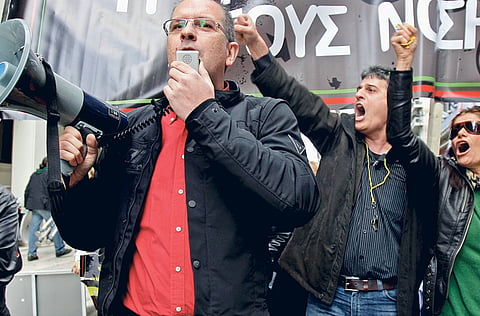EU urges coordinated bilateral loans for Greece
Barroso suggests a package of government-to-government loans

Brussels : The European Commission has urged Germany and other euro zone governments to put up a package of government-to-government loans to ease Greece's financial plight and end weeks of financial turmoil and speculation.
European Commission President Jose Manuel Barroso said on Friday that European aid is necessary because "we cannot prolong any further the current situation".
He spoke of "coordinated bilateral loans" that would not have to be paid out immediately.
Even as a standby gesture, Barroso said, the availability of aid from Greece's partners would show financial markets that EU nations are united to defend their single currency and the stability of the euro zone.
Speaking to reporters, Barroso urged EU leaders to agree on "coordinated bilateral loans" at a two-day summit opening on Thursday in Brussels.
He did not elaborate on loan or participation conditions or other details.
Positive developments
In Athens, Greek government spokesman George Petalotis called Barroso's appeal a "positive development".
"We would like a clear declaration of this so that we can borrow money at a reasonable rate," Petalotis told media in Athens.
EU sources have estimated that Greece needs a financial injection of about 20 billion euros (Dh99.5 billion).
Barroso's proposal came as Germany and the EU head office were at loggerheads after German officials said Berlin can't rule out financial aid for Greece from the International Monetary Fund.
EU officials prefer to resolve the Greek financial crisis through European aid. But Barroso said he "did not want to speculate if there will be a financial contribution from the IMF".
Germany — Europe's biggest economy — has been reluctant to pledge direct financial aid because German public opinion takes a dim view of the shoddy statistics-keeping that have long hidden the true size of Greek deficits and debts.
On Thursday, Greece warned it would be forced to turn to the IMF for help — which would be an embarrassment for the single currency bloc — if the EU fails to extend any concrete support package to help reduce its market borrowing rates.
A European or IMF backstop would be aimed at reassuring markets and bringing down the high rates demanded from Greece as it seeks to borrow some 54 billion euros (Dh268.8 billion) this year to plug its budget gap.
IMF assistance
"We haven't ruled out IMF financial assistance," Ulrich Wilhelm, a spokesman for German Chancellor Angela Merkel, told reporters.
EU sources, speaking privately due to the sensitive nature of the issue, said Germany would have to take part in a loan package, or "the deal would not be credible".
The European Commission would oversee the loan programme. Lending would be available at interest rates below those charged by commercial banks, these sources said.
Greece hasn't asked for any financial support.
A Greek default would be a serious blow to the euro, but Germany in particular has resisted putting up money to bail Greece out after years of overspending.
Earlier on Friday, the European Commission was at pains to point out that Merkel committed to a "European" solution to the Greek financial crisis only last month.



